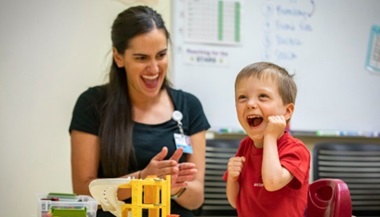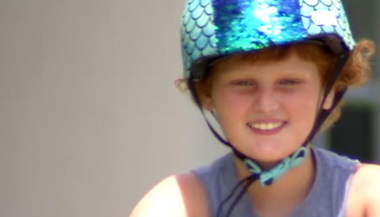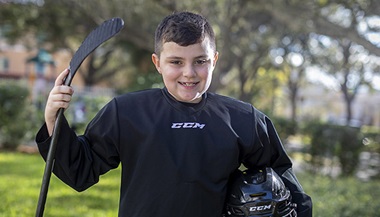Patient Story
Plastic and Reconstructive Surgery: Fatima's Story
Patient Story Highlights
- Craniofacial conditions affect a child's physical appearance, as well as feeding, hearing, speech, and vision.
- Fatima's craniofacial abnormalities were properly treated at Johns Hopkins all Children's Hospital.
- Our surgeons work closely with the other specialists to correct the anomalies appearance and function of each patient's face.

Fatima displays an easy smile and a ready laugh.
Her mother quietly stands in the corner, tearing up with pride over the girl who has had eight surgeries in four countries and still awaits reconstruction of her nose. The family left Fatima’s native Syria about seven years ago as pro-democracy protests challenged President Bashar al-Assad, leading to a devastating civil war. Stops in Lebanon and Turkey followed. Two years ago, the family came to America. Fatima’s last surgery about a year earlier in the Middle East had left her with a plastic tube sticking out of her nasal passage. She spoke no English.
Now 16, Fatima’s resilience surpasses most teenagers’.
“My country is good,” she says in the language she rapidly is learning. “Some of the people are not so good.”
Early Challenges
Records are scarce from Fatima’s early childhood, but Ernesto Ruas, M.D., a plastic surgeon at Johns Hopkins All Children’s Hospital says she was born with craniofacial anomalies, including a nasal encephalocele, a birth defect that causes a groove in the middle of the skull from the forehead to the nose. Encephaloceles are rare, occurring in about one in 5,000 live births.
Along with her nose, Fatima’s forehead and cheek didn’t form correctly on the right side and her right eye is only sensitive to light. She had three surgeries before leaving Syria, the first at 8 months old. She had two in Lebanon and one during the five years she lived in Turkey.
When the family came to Tampa two years ago, they connected with a local general surgeon who knew Maureen (Mo) Doyle, R.N., a nurse at Johns Hopkins All Children’s. Doyle works often with Ruas, who specializes in facial reconstruction, and she recommended that he could help Fatima.
“I’m really thankful for everyone on board with Fatima’s life,” says Florence Ackey, the refugee health coordinator with the Florida Department of Health who has worked with Fatima’s family for two years. “The transformation is amazing. That really shows what a community coming together can do.”
Ruas first performed a procedure on Fatima in December 2017, using bone grafts from her skull to rebuild the right side of her forehead and cheek. He rotated a flap of skin to fit her reshaped face. In June 2018, Ruas inserted a tissue expander in her forehead. Each week, Fatima visits the office to have saline injected to stretch the skin. Eventually, there will be enough to combine with rib cartilage to form a nose.
Surgery is scheduled for Oct. 8.
“The doctor is very nice,” says Fatima, who takes online classes and is in the 11th grade. “He will give me a new nose.”
A Familiar Story
As Fatima relates her story, it reminds Ruas of his own. They both have made the best of difficult situations.
Ruas was born in Massachusetts but grew up in Cuba where his parents were doctors. After Fidel Castro came to power in 1959, Ruas’ parents left for Florida, allowing him opportunity and education. Ruas earned his medical degree and did resident training in surgery and plastic surgery at the Johns Hopkins University School of Medicine and The Johns Hopkins Hospital. He later did fellowship training in craniofacial surgery in Mexico City.
“In some respects, we were both very fortunate that bad things happened in our country,” Ruas tells Fatima. “That allowed us to do good things. Bad things can lead to good things.”
Looking Ahead
Fatima’s family is taking advantage of the opportunity. Her father, Zaki, works as a tailor. Fatima and two younger brothers are adjusting well to their new home.
“Here I have no problems,” Fatima says. “I like everybody because everyone is the same. I want to become a doctor and help my family.”
Fatima hopes Ruas will form her nose to look like her mother, Mawlouda’s. “My mom’s beautiful,” she says. “She says, ‘Be good. Be strong.’”
After the October surgery, Ruas will have Fatima return for some minor touchups to “put the icing on the cake,” but much of the facial reconstruction will be complete. Fatima will move ahead with a new nose, a new face and a great attitude.
“I saw a doctor in Syria who said, ‘She doesn’t need surgery. She needs to die,’” Fatima says. “Where is this doctor? I need to go see him.”

.jpg?h=100&iar=0&w=80&hash=E21743D7062D441BC7AB737B02538757)



